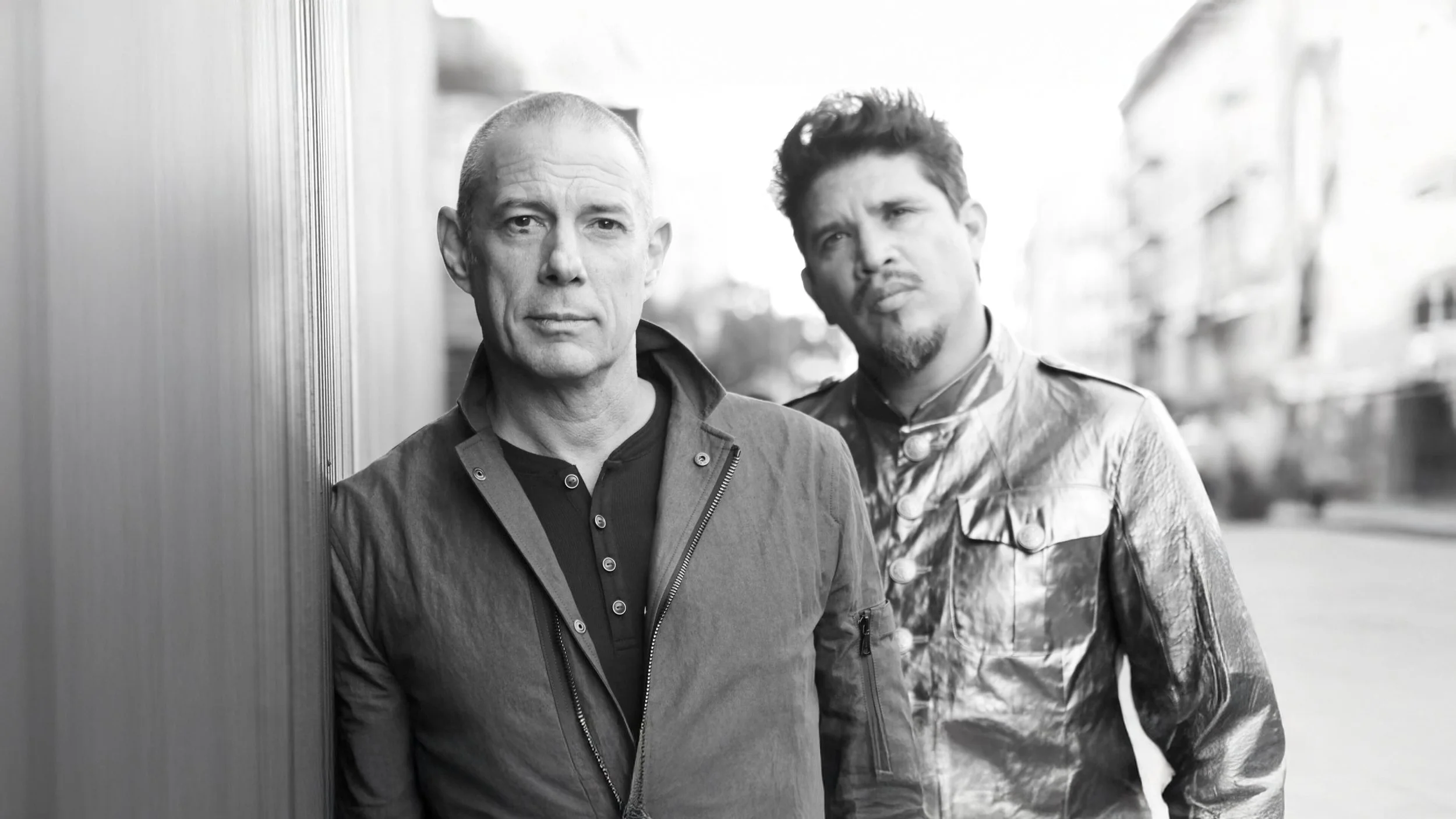
Thievery Corporation
Name & Pronunciation: Thievery Corporation (often shortened to “Thievery Corp”) -pronounced THIEV-ə-ree Corporation
Years Active & Status: 1995 to Present (active)
Origin & Heritage: Washington, D.C., USA; rooted in a melting pot of musical cultures (reggae, dub, bossa nova, jazz, Middle Eastern, Indian, Latin, etc.)
Hook: A genre-defying electronic duo that blend conscious reggae/dub roots with lush downtempo, global instrumentation, and political messaging to craft sweeping soundscapes that are both danceable and thought-provoking.
Motto/Tagline: “Music where you don’t know whether it was recorded today or a decade ago”
BIOGRAPHY
Rob Garza and Eric Hilton first met around the mid-1990s in Washington, D.C., in the milieu of the Eighteenth Street Lounge (Hilton was co-owner). The two bonded over eclectic record collecting - digging into sounds from Brazil, Jamaica, Iran, India, vintage jazz, and more -and soon began collaborating as Thievery Corporation. Their earliest productions were homegrown and experimental, seeking to transcend genre limitations rather than adhere to them.
In 1996 they released their debut, Sounds from the Thievery Hi-Fi, which already showcased their interest in blending downtempo electronica with dub, jazz, and world styles. Over subsequent albums, they gradually expanded both the sonic palette and their roster of guest vocalists and instrumentalists. Their compositions began to incorporate strings, horns, sitars, tablas, and a wide variety of global vocalists singing in English, French, Persian, Portuguese, and more.
By the early 2000s, Thievery was drawing wider recognition, aided by signature tracks like “Lebanese Blonde” (from The Mirror Conspiracy). They built a reputation not just for chillout/lounge electronica, but for weaving political, social, and spiritual themes through their work. Their live performances evolved into full-band experiences with multiple vocalists, percussionists, and improvisational elements rather than pure DJ sets.
In the 2010s and beyond, Thievery has continued to experiment. The 2014 album Saudade leaned heavily into Brazilian and bossa nova influences, while The Temple of I & I (2017) was largely tracked in Jamaica to deepen their connection to roots and dub. Though touring has become more selective - Eric Hilton has at times preferred to focus on studio work -the group remains active in releasing new projects and performing globally.
REGGAEEDM ANALYSIS
Reggae Roots
Rhythm: Thievery often deploys the classic one drop or steppers feel, interspersed with electronic rhythmic patterns and syncopation. They lean on space and subtle swing rather than heavy quantization.
Bass: Their basslines draw from dub traditions, deep, warm, rolling, sometimes echoed or filtered. The low end is typically prominent and carries both melodic and rhythmic weight.
Vocals/Message: They often foreground conscious, global minded lyrics, with vocalists addressing themes of social justice, unity, identity, displacement, and resistance. The tone is contemplative rather than preachy.
Electronic/EDM Techniques
Hybrid Live/Electronic Arrangement: They often blend live instrumentation (drums, guitars, strings, percussion) with synthesizers and samples, blurring the line between a band and electronic producers.
Textural Sound Design: Use of ambient pads, field recordings, dub delay and reverb layering, and granular effects to create expansive atmospheres.
Global Sample Integration & Rhythmic Modulation: They sample or emulate non Western instruments (sitar, tabla, Persian strings, etc.), sometimes altering time signatures or microtiming to evoke cross cultural hybridity.
Essential Works & What to Listen For
“Lebanese Blonde” (2000) - One of their signature tracks; listen for the melding of haunting samples, smooth breaks, and world instrumentation that became emblematic of their style.
The Mirror Conspiracy (2000) - A breakthrough record that polished their sound and expanded their reach; “Lebanese Blonde,” “Air Batucada,” and lush interludes are standouts.
The Richest Man in Babylon (2002) - Deepens their political and global scope, with guest vocalists and a heavier reggae/dub interplay.
The Cosmic Game (2005) - More ambitious collaborations (David Byrne, Flaming Lips) and expanded sonic textures; shows their willingness to push boundaries.
Saudade (2014) - A delicate, intimate album leaning into bossa nova and Brazilian textures, with deep emotionality and restraint.
The Temple of I & I (2017) - A deliberate turn toward roots reggae and authenticity, with much of the recording done in Jamaica and influence of Jamaican studio culture.
Influence on ReggaeEDM
Innovations: They helped pioneer the idea that reggae/dub sensibilities could be integrated into global electronic music without sounding derivative; they moved beyond “dubstep reggae” to a more sophisticated hybrid.
Impact: Many later artists in the world influenced downtempo / reggae electronic space cite Thievery as a template for blending conscious vocals, live instrumentation, and electronic production in a seamless way.
RECOMMENDED ALBUMS
Sounds from the Thievery Hi Fi (1996)
Spotify: https://open.spotify.com/album/3aQCZj9daJ9DAhUs7xirdN
Key tracks: “Assault on Babylon,” “A Warning (Dub),” “Universal Highness”
Notes: Their debut lays the groundwork, mixing dub, lounge, jazz, and early electronica elements in a warm, exploratory format.The Mirror Conspiracy (2000)
Spotify: https://open.spotify.com/album/7eH0DZ6Y9bInoU0breGFFe?si=XB3XK_6aRuWKV2i7Evuigw
Key tracks: “Lebanese Blonde,” Shadows of Ourselves,” “Air Batucada”
Notes: Breakthrough maturation, cleaner production, more cohesion, iconic tracks.The Richest Man in Babylon (2002)
Spotify: https://open.spotify.com/album/7qJaVqhgiBtPLb9MOzwmZA
Key tracks: “The Richest Man in Babylon,” “The State of the Union,” “All That We Perceive”
Notes: Blends political consciousness with melodic dub electronic compositions.Saudade (2014)
Spotify: https://open.spotify.com/album/0XSDdumsjbikADECzlPMXq
Key tracks: “Depth of My Soul (feat. Shana halligan),” “Firelight” “Saudade”
Notes: One of their most emotionally direct albums, strong influence from Brazilian music.The Temple of I & I (2017)
Spotify: https://open.spotify.com/album/3naxO4ZMrfJqEpEKjkVvlH
Key tracks: “Thief Rockers,” “Let the Chalice Blaze,” “The Temple of I & I”, “Letter to the Editor”, “Strike the Root (ft. Notch)”
Notes: Recorded largely in Jamaica, this is their earnest tribute to roots and dub traditions.







